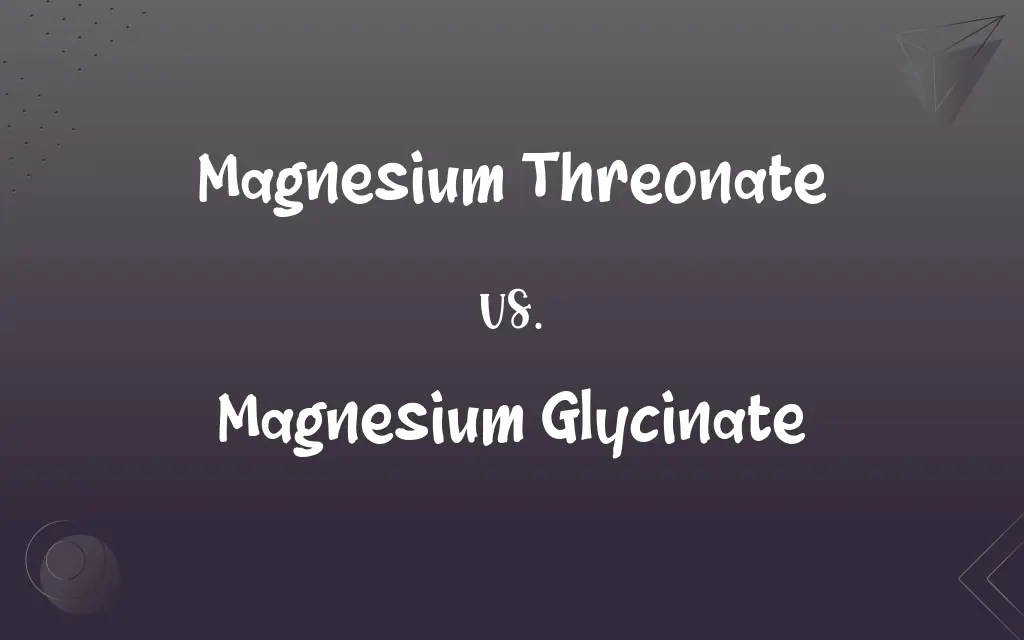Magnesium Threonate vs. Magnesium Glycinate: What's the Difference?
Edited by Aimie Carlson || By Janet White || Published on January 18, 2024
Magnesium threonate is primarily used for cognitive enhancement, while magnesium glycinate is favored for muscle relaxation and better sleep.

Key Differences
Magnesium threonate is a form of magnesium bound to threonic acid, enhancing its ability to cross the blood-brain barrier. This unique property is what sets it apart from magnesium glycinate, a magnesium form bonded to the amino acid glycine. While both are effective in increasing magnesium levels in the body, magnesium threonate specializes in targeting the brain, potentially improving cognitive functions.
Magnesium glycinate is known for its calming effects on the body and mind. It combines magnesium with glycine, a neurotransmitter that promotes relaxation. This contrast with magnesium threonate, which, though it also offers calming effects, is more focused on cognitive health, including memory and learning enhancement.
The bioavailability of magnesium threonate is significant due to its ability to penetrate the brain, offering potential benefits in neuroprotection and mental clarity. In contrast, magnesium glycinate is highly bioavailable too, but it primarily focuses on systemic benefits like muscle health, stress relief, and sleep improvement.
Magnesium threonate is often researched for its potential in treating age-related memory loss and cognitive decline, while magnesium glycinate is typically recommended for those dealing with muscle cramps, anxiety, and sleep disorders. This distinction highlights how each compound is tailored to address different health concerns.
Magnesium threonate is tailored towards cognitive health and brain function, making it a unique form of magnesium. On the other hand, magnesium glycinate is appreciated for its effectiveness in muscle relaxation, stress relief, and improving sleep quality, offering benefits more related to physical well-being.
ADVERTISEMENT
Comparison Chart
Primary Use
Enhances cognitive functions, brain health
Relieves muscle tension, promotes relaxation
Bioavailability
High, with efficient brain absorption
High, absorbed well by the body
Key Component
Threonic acid
Glycine
Targeted Benefits
Memory, learning, brain aging
Muscle cramps, stress, sleep
Ideal For
Cognitive enhancement, neuroprotection
Muscle relaxation, anxiety, sleep disorders
ADVERTISEMENT
Magnesium Threonate and Magnesium Glycinate Definitions
Magnesium Threonate
It is researched for its role in treating age-related cognitive issues.
Magnesium threonate is being studied for its effects on Alzheimer's disease.
Magnesium Glycinate
It's effective in improving overall sleep quality and relaxation.
Since starting magnesium glycinate, my sleep has been more restful and uninterrupted.
Magnesium Threonate
It is known for its ability to cross the blood-brain barrier effectively.
Magnesium threonate's unique property helps in maintaining brain health.
Magnesium Glycinate
Magnesium glycinate is a magnesium salt bound to glycine, known for its calming effects.
I take magnesium glycinate at night for better sleep.
Magnesium Threonate
Magnesium threonate is a magnesium salt of threonic acid, aiding cognitive health.
After taking magnesium threonate, I noticed improved memory and focus.
Magnesium Glycinate
It is favored for its high bioavailability and gentle effect on the stomach.
Magnesium glycinate is my go-to supplement as it doesn't upset my stomach.
Magnesium Threonate
Magnesium threonate can potentially improve learning and memory.
Students often use magnesium threonate to boost their learning capabilities.
Magnesium Glycinate
Magnesium glycinate is beneficial for managing stress and anxiety.
My therapist recommended magnesium glycinate to help with my anxiety symptoms.
Magnesium Threonate
This compound is used in supplements for enhanced brain function and neuroprotection.
Doctors recommend magnesium threonate for its potential in slowing cognitive decline.
Magnesium Glycinate
This form is often used to relieve muscle cramps and improve relaxation.
After intense workouts, magnesium glycinate helps soothe my muscle soreness.
FAQs
How does magnesium threonate benefit the brain?
It crosses the blood-brain barrier, potentially improving memory and learning.
Can magnesium threonate help with cognitive decline?
It's studied for its potential in slowing age-related cognitive issues.
What are the benefits of magnesium glycinate?
It's used for muscle relaxation, stress relief, and improving sleep quality.
Who should take magnesium glycinate?
Suitable for individuals seeking muscle relaxation and better sleep.
Is magnesium glycinate good for anxiety?
Yes, it's beneficial in managing stress and anxiety symptoms.
Who should take magnesium threonate?
Ideal for those focusing on cognitive enhancement and brain health.
How does magnesium threonate affect sleep?
While not its primary use, it can indirectly improve sleep through better brain health.
What is magnesium threonate?
A form of magnesium linked to threonic acid, used for cognitive health.
Can magnesium threonate improve memory?
It has potential benefits for memory enhancement, especially in the elderly.
What is magnesium glycinate?
A magnesium salt combined with glycine, known for relaxation and muscle health.
Is magnesium threonate better than other forms of magnesium?
It's more targeted for cognitive health, but other forms have different benefits.
Are there any side effects of magnesium threonate?
Generally well-tolerated; possible side effects include headache or dizziness.
Are there any side effects of magnesium glycinate?
Rarely, it may cause gastrointestinal upset or allergic reactions.
Is magnesium glycinate better for digestion?
Yes, it's gentle on the stomach compared to other magnesium forms.
How quickly does magnesium glycinate work?
Some effects, like muscle relaxation, can be felt within hours of ingestion.
Can magnesium glycinate help with muscle cramps?
Yes, it's effective in relieving muscle cramps and tension.
Can magnesium threonate help with ADHD?
Some studies suggest potential benefits, but more research is needed.
How quickly does magnesium threonate work?
Effects on cognitive function may take several weeks to become noticeable.
How does magnesium glycinate affect sleep?
It directly aids in improving sleep quality due to its calming properties.
Can magnesium glycinate help with fibromyalgia?
It may provide relief due to its muscle relaxant properties.
About Author
Written by
Janet WhiteJanet White has been an esteemed writer and blogger for Difference Wiki. Holding a Master's degree in Science and Medical Journalism from the prestigious Boston University, she has consistently demonstrated her expertise and passion for her field. When she's not immersed in her work, Janet relishes her time exercising, delving into a good book, and cherishing moments with friends and family.
Edited by
Aimie CarlsonAimie Carlson, holding a master's degree in English literature, is a fervent English language enthusiast. She lends her writing talents to Difference Wiki, a prominent website that specializes in comparisons, offering readers insightful analyses that both captivate and inform.






































































